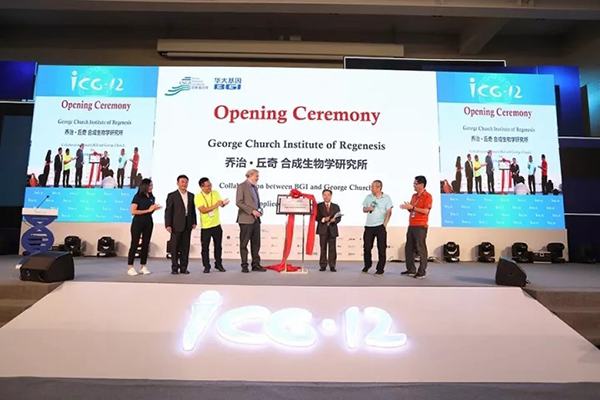


Chinese genomics institute BGI Research on Oct. 26 announced that it has launched an institute of synthetic biology with George Church, a professor of genetics at Harvard Medical School.
The George Church Institute of Regenesis, which will be established on the synthesis and editing platform of the China National Genebank, plans to focus its studies on three major cutting-edge fields, including high-density DNA storage, bio-manufacturing of natural materials, and medical genome editing.
George Church will be the chief scientist of the institute that bears his name.
Yang Huanming, BGI chairman and academician at the Chinese Academy of Sciences, told Xinhua News Agency that Church has made a strong commitment to support the research of BGI, especially in the area of synthetic organisms.
“We are actively exploring for the innovative application of synthetic organisms in the fields of precision-medicine, in-vivo detection, and proteomics detection and treatment,” said Church, who has been a longtime advisor to BGI.
Xu Xun, director of BGI Research, believes that the rewriting of genes will be another major task of biosynthesis, following genetic sequencing, and the institute will be committed to the development of this technology.
Church is the director of a personal genome project at Harvard Medical School and he published the first direct genomic sequencing method in 1984. He was nominated for the Nobel Prize in Chemistry last year.
 Fire brigade in Shanghai holds group wedding
Fire brigade in Shanghai holds group wedding Tourists enjoy ice sculptures in Datan Town, north China
Tourists enjoy ice sculptures in Datan Town, north China Sunset scenery of Dayan Pagoda in Xi'an
Sunset scenery of Dayan Pagoda in Xi'an Tourists have fun at scenic spot in Nanlong Town, NW China
Tourists have fun at scenic spot in Nanlong Town, NW China Harbin attracts tourists by making best use of ice in winter
Harbin attracts tourists by making best use of ice in winter In pics: FIS Alpine Ski Women's World Cup Slalom
In pics: FIS Alpine Ski Women's World Cup Slalom Black-necked cranes rest at reservoir in Lhunzhub County, Lhasa
Black-necked cranes rest at reservoir in Lhunzhub County, Lhasa China's FAST telescope will be available to foreign scientists in April
China's FAST telescope will be available to foreign scientists in April "She power" plays indispensable role in poverty alleviation
"She power" plays indispensable role in poverty alleviation Top 10 world news events of People's Daily in 2020
Top 10 world news events of People's Daily in 2020 Top 10 China news events of People's Daily in 2020
Top 10 China news events of People's Daily in 2020 Top 10 media buzzwords of 2020
Top 10 media buzzwords of 2020 Year-ender:10 major tourism stories of 2020
Year-ender:10 major tourism stories of 2020 No interference in Venezuelan issues
No interference in Venezuelan issues
 Biz prepares for trade spat
Biz prepares for trade spat
 Broadcasting Continent
Broadcasting Continent Australia wins Chinese CEOs as US loses
Australia wins Chinese CEOs as US loses